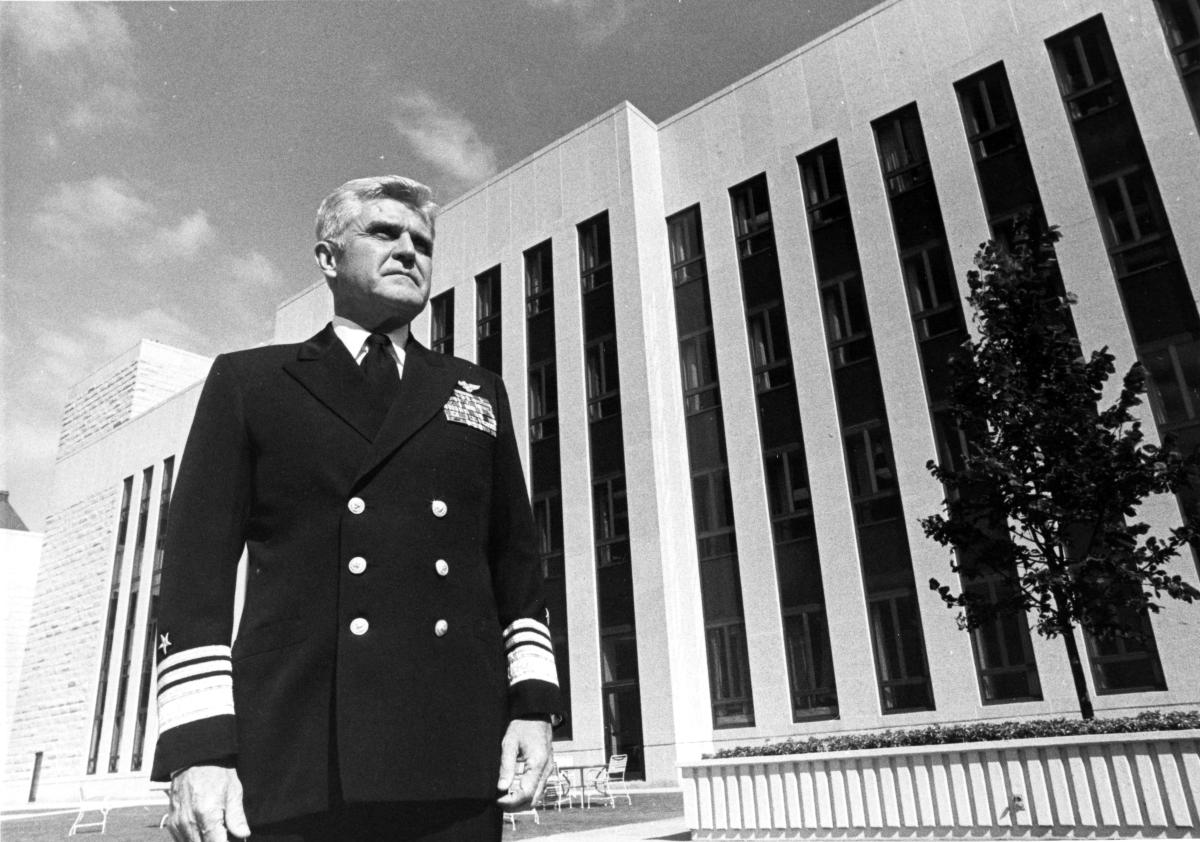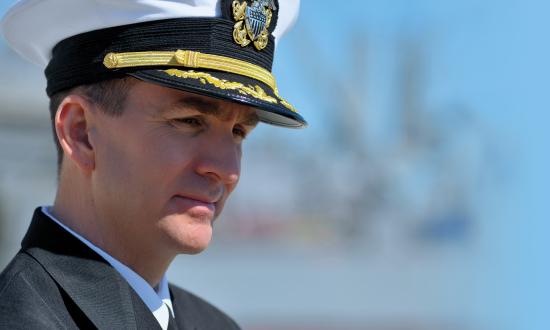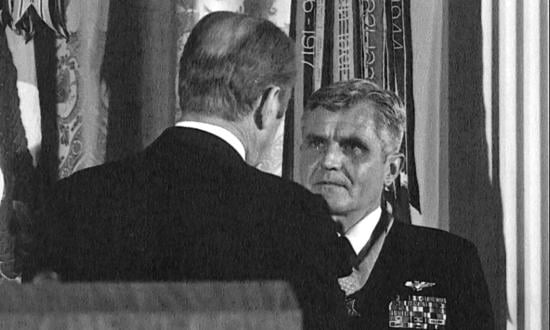When I wound up my command tour, I thought about Vice Admiral James Stockdale’s 1983 article “Trial by Fire” in The Retired Officer. I met Admiral Stockdale in 1993, and he commissioned me in 1996. I have lost count of how times I realized how brilliant he was. My career successes have been, in large part, because of the effect his thoughts on leadership had on me.
If I could break down the article, I would add my thoughts to each trait he mentions.
A Crisis Leader
Our changing times demand the kind of person who can lead in troubled times. . . . I’m not talking about our “nominal” leaders who look the part, who say the right things, who indeed may be the right people in calm waters. I’m talking about the leaders who will, to use Melville’s phrase, “in time of peril” come out of nowhere to ultimately control the flow of events: the businessman who rises to the top to keep a company afloat during a depression; the warrior who takes command of a decimated battalion, rallies its spirit, and makes it whole again; the mayor who gets the bankrupt city back on its feet.
Who would have thought that halfway into my command tour there would be a pandemic? Our world saw a significant rudder shift to focus on stopping the spread of COVID-19, educating and vaccinating the population, and keeping our warfighters in the fight. We had people come from nowhere to take charge of the situation. Sure, there were many who looked the part and said the right things but when the pressure was on, they fell to the side, and the real leaders, whether in charge or not, took over.
In my case, I was especially proud of the junior officers who had the energy, patience, and stamina to remain flexible and successful despite the many changes we experienced as we fought the pandemic. As a commanding officer, my role was to remove obstacles and keep the minutia down to a minimum so they could simply do their jobs.
It also made me realize that we are in good hands as the torch is passed.
A Moralist
To lead under duress, one must be a moralist. By that, I don’t mean being a poseur, one who sententiously exhorts his comrades to be good. I mean he must be a thinker. He must have the wisdom, the courage, indeed the audacity to make clear what, under the circumstances, the good is. This requires a clear perception of right and wrong and the integrity to stand behind one’s assessment. The surest way for a leader to wind up in the “ashcan of history” is to have a reputation for indirectness or deceit.
As I have progressed in rank and responsibility, I have seen the damage done by people who are indirect or dishonest—and been frustrated that some of them were promoted anyway. Then when something bad occurs, people state something to the effect of “I’m not surprised.” The system is just, we just need to follow it.
I have seen some “leaders” who simply will not address a problem head on. I have seen some who dodged making the hard decision because of what people would think about them or the fear of an inspector general complaint. I would submit that people want their leaders to make decisions. They may not like it, but they likely will at least respect that you made a decision.
I found adhering to “Honor, Courage, and Commitment” really does matter.
A Writer of Law
There are times when leaders must be jurists, when their decisions must be based solely on their own ideas of fairness. In effect, they will be writing “law.” When they’re on the hot seat, they’ll need the courage to withstand the inclination to duck a problem. Many of their laws will necessarily be unpopular, but they must never be unjust.
There were times when I made unpopular decisions that angered people, and I had to both own it and address it head-on. In many cases, all the facts of the situation cannot be shared, which might lead to an inspector general complaint.
When at the Newport Naval Leadership and Ethics Center, I remember hearing, “If you see the IG coming, it’s time to be nervous.” I did not like that comment then and I still do not. One should not fear the system, nor should it be advertised as such. If the IGs are doing their job, which I am confident they are, it should be a learning experience, not something to lose sleep over.
What I have seen, however, is that sometimes leaders are scared to hold people accountable. This leads to things not getting done and morale being brought down with it. By and large, the Navy has incredible people doing incredible things. They are passionate and want to see great things happen for the organization. If they see someone not carrying their weight, they want accountability.
The best advice I received was from a senior mentor many years ago: “I always give people three strikes. After three strikes, they are out. If not, it slows down the organization.” I firmly agree with giving people a second chance, but if it continues, the organization needs to move on.
A Teacher
Every good leader is a good teacher. He or she is able to give those nearby a sense of perspective and to set the moral, social, and particularly the motivational climate among followers. This is not an easy task. It takes wisdom and self-discipline. . . . A leader must inspire to strength, compassion, and conviction several orders greater than required by society in general.
I saw this as the greatest thing I could do as a commanding officer. I tried to teach my staff to be better and show them ways to be better based on what I was taught and experienced—consistently giving back everything to the people who will replace me. If we love the Navy, we need to train the people who will replace us.
I encouraged my staff to engage in the Navy. I encouraged them to join the U.S. Naval Institute, whose mission is to “provide an independent forum for those who dare to read, think, speak, and write to advance the professional, literary, and scientific understanding of sea power and other issues critical to global security.” If I have learned anything from my lifetime membership in the Naval Institute, it is that they are listening to what I have to say; I just need to say it. I tried to teach sailors to keep engaged in what is going on in the Navy.
I wanted to teach them and give them everything so that, when my career is over, my tank will be empty and I will have passed along everything I had to offer.
A Steward
A leader must remember that he is responsible for his charges. He must tend the flock, not only cracking whip, but “washing their feet” when they are in need of help. Leadership takes compassion. It requires knowledge and character and heart to boost others up and show them the way.
“Tend the flock” reminds me of the responsibility I have to care for the people I served as commanding officer.
My second command master chief was a boatswain mate who told me, “The Navy is a culture shock.” What he meant is the Navy is no place for amateurs. It is too dangerous. So he taught me the tough lessons that are inherent in the Navy, but at no time did I ever think he did not care for me and want the best for me. He praised me when I needed it and held me accountable when I made errors.
For me, Command Master Chief Richard Bate was a man who took care of me. More than 35 years after serving with him, I am still reminded of the manner in which he shaped me as a hospital corpsman, officer, and commanding officer.
A Philosopher
Good leaders need a philosophical outlook. At least he or she should understand and be able to compassionately explain, when necessary, that there is no evidence that the way of the world assures the punishment of evil or the reward of virtue. . . . Often, when they come face to face with the fact that this is not always so, they are crushed. The only way I know to handle failure is to gain historical perspective, to think about people who have successfully lived with failure.
I had to teach that the Navy, on occasion, is indeed not fair. Unfortunate things happen to good people. Whether it be a death, career disappointments, or times when the system seems so big that we are tripping over ourselves, it is sometimes hard to believe things will be okay. I think that is what the Navy has taught me best. Wherever I was, whatever I was doing, and when I was overwhelmed, the Navy provided the perspective that made me understand that, though things sometimes do not go right, they will work out in the end. We will reach that light at the end of the tunnel.
I have had many leaders over the years who have shown me that despite difficulties, the system is just and worth serving.
For me, it was Vice Admiral Stockdale.






